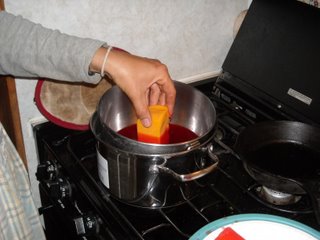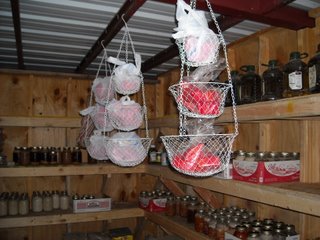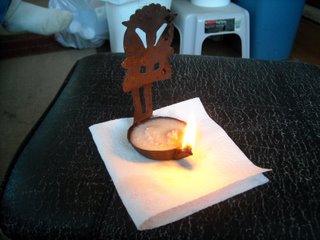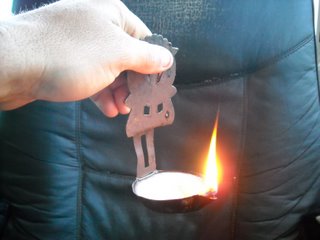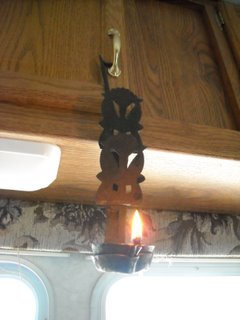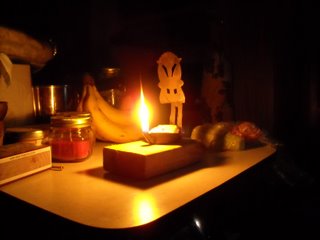At the fall, all men — Adam and his progeny — were brought into darkness — complete spiritual darkness due to a loss of the spiritual Light of God, which results in complete blindness to spiritual things:
John 1:5 – “And the light shineth in darkness; and the darkness comprehended it not.“
Men are blind to the light of nature that points to God (it does nothing salvific in their lives); and they are blind to Christ, the Light of the world (for some, this is blindness to who He truly is and what He truly did, even if they have a claimed knowledge of Him!). A soul that is not born-again cannot see the kingdom of God:
John 3:3 – “Jesus answered and said unto him, Verily, verily, I say unto thee, Except a man be born again, he cannot see the kingdom of God.“
which is here now:
Matt 3:1-2 – “1 In those days came John the Baptist, preaching in the wilderness of Judaea, 2 And saying, Repent ye: for the kingdom of heaven is at hand.“
and
Mark 1:14-15 – “14 Now after that John was put in prison, Jesus came into Galilee, preaching the gospel of the kingdom of God, 15 And saying, The time is fulfilled, and the kingdom of God is at hand: repent ye, and believe the gospel.“
The noted Puritan commentator, Dr. John Gill, says this about the kingdom of God in these verses:
for the kingdom of heaven is at hand: by which is meant not the kingdom of glory to be expected in another world; or the kingdom of grace, that is internal grace, which only believers are partakers of in this; but the kingdom of the Messiah, which was “at hand”, just ready to appear, when he would be made manifest in Israel and enter upon his work and office: it is the Gospel dispensation which was about to take place, and is so called; because of the wise and orderly management of it under Christ, the king and head of his church by the ministration of the word, and administration of ordinances; whereby, as means, spiritual and internal grace would be communicated to many, in whose hearts it would reign and make them meet for the kingdom of glory; and because the whole economy of the Gospel, the doctrines and ordinances of it are from heaven. This phrase, “the kingdom of heaven” is often to be met with in Jewish writings; and sometimes it stands opposed to the “kingdom of the earth”; by it is often meant the worship, service, fear, and love of God, and faith in him: thus in one of their books having mentioned those words, “serve the Lord with fear”: it is asked, what means this phrase, “with fear?” It is answered, the same as it is written, “the fear of the Lord is the beginning of wisdom”; and this is “the kingdom of heaven”.
Here is what he says about seeing the kingdom of God:
And by this phrase our Lord signifies, that no man, either as a man, or as a son of Abraham, or as a proselyte to the Jewish religion, can have any true knowledge of, or right unto, the enjoyment of the kingdom of God, unless he is born again; or regenerated, and quickened by the Spirit of God; renewed in the spirit of his mind; has Christ formed in his heart; becomes a partaker of the divine nature; and in all respects a new creature; and an other in heart, in principle, in practice, and conversation; or unless he be “born from above”, as the word is rendered in John 3:31; that is, by a supernatural power, having the heavenly image stamped on him; and being called with an heavenly calling, even with the high calling of God in Christ Jesus: if this is not the case, a man can have no true knowledge of the kingdom of the Messiah, which is not a temporal and carnal one; it is not of this world, nor does it come with observation; nor can he have any right to the ordinances of it, which are of a spiritual nature; and much less can he be thought to have any true notions, or to be possessed of the kingdom of grace, which lies in righteousness, peace, and joy in the Holy Ghost; or to have either a meetness for, or a right unto the kingdom of glory
Besides God’s kingdom, as Dr. Gill noted, there is the kingdom of this world, over which Satan has rule as prince:
Eph 2:2 – “Wherein in time past ye walked according to the course of this world, according to the prince of the power of the air, the spirit that now worketh in the children of disobedience“
Again, Dr. Gill:
according to the prince of the power of the air: which is not to be understood of any supposed power the devil has over the air, by divine permission, to raise winds, but of a posse, or body of devils, who have their residence in the air; for it was not only the notion of the Jews, that there are noxious and accusing spirits, who fly about “in the air” and that there is no space between the earth and the firmament free, and that the whole is full of a multitude of them; but also it was the opinion of the Chaldeans, and of Pythagoras, and Plato, that the air is full of demons: now there is a prince who is at the head of these, called Beelzebub, the prince of devils, or the lord of a fly, for the devils under him are as so many flies in the air, Mt 12:24 and by the Jews called “the prince of spirits”; and is here styled, the Spirit that now worketh in the children of disobedience; by which spirit is meant, not the lesser devils that are under the prince, nor the spirit of the world which comes from him, and is not of God; but Satan himself, who is a spirit, and an evil, and an unclean one; and who operates powerfully in unbelievers, for they are meant by children of disobedience, or unbelief; just as “children of faith” in the Jewish dialect, designs believers; and over these Satan has great influence, especially the reprobate part of them; whose minds he blinds, and whose hearts he fills, and puts it into them to do the worst of crimes; and indeed, he has great power over the elect themselves, while in unbelief, and leads them captive at his will; and these may be said in their unregeneracy to walk after him, when they imitate him, and do his lusts, and comply with what he suggests, dictates to them, or tempts them to.
With the world full of darkness, ruled by Satan, and given that the darkness cannot comprehend the light, it stands to reason that, if you live as part of the world, by its rudiments (Col 2:8 — its economic, political, social, religious systems and principles, etc.), you have surrounded yourself with a barrier of spiritual darkness that hedges AGAINST the Light of the Gospel. You live in a situation where everything around and that has influence on your life RESISTS spiritual Light.
Is that the best for a person who claims the name of Christ? Or perhaps, if you see no problem living as part of a world that is darkness, surrounded and affected by that darkness, then perhaps you are part of that darkness.
Of course, every person is in darkness until God, by His own sovereign will, shines His Light and pushes out the darkness of one’s heart, as the sun does to the darkness of the night every morning; but if the Light is shining, does that mean you plant your garden in a box with no windows?
And so, where can a clearer, less obstructed view of the Light be found? Christ is the Light…
John 8:12 – “Then spake Jesus again unto them, saying, I am the light of the world: he that followeth me shall not walk in darkness, but shall have the light of life.“
…the Church is the body of Christ…
1 Cor 10:16-17 – “16 The cup of blessing which we bless, is it not the communion of the blood of Christ? The bread which we break, is it not the communion of the body of Christ? 17 For we being many are one bread, and one body: for we are all partakers of that one bread.“
and
Rom 12:5 – “So we, being many, are one body in Christ, and every one members one of another.“
…thus the Bible says that the Church is the light of the world, which is as the moon that reflects the light of the sun onto the earth:
Phil 2:15 – “That ye may be blameless and harmless, the sons of God, without rebuke, in the midst of a crooked and perverse nation, among whom ye shine as lights in the world“
I submit to you that the proper way a Christian should live is:
- separated from the world and its darkness with the world being your provider
- separated to living life with the body of Christ, in daily fellowship, under the direct provision of God to supply your needs (Him providing rain, Him providing the increase of plant and animal food, etc.)
This isn’t something you do once or twice a week: it requires the entirety of your life. You need to be AWAY from the DARKNESS and WITH the LIGHT.
I have found this to be true. By living separated from the world in Christian community, I have come to a greater knowledge and understanding of the darkness in my life and heart — my sin and lack of love toward God and the brethren, what it means to love and trust God and to love the brethren (Matt 22:36-40), who Christ is and what it means to be a part of His body, my lack of meekness and humility, and many other areas of spiritual Light. I submit to you that unless you do that, the best you’ll have in your Christian walk is living an unfruitful life; the worst you’ll have is that you never realize that you are actually lost (2 Cor 13:5).
The darkness DOES NOT comprehend the light. And so, by the way you live, how is your comprehension of the Light?
— David






